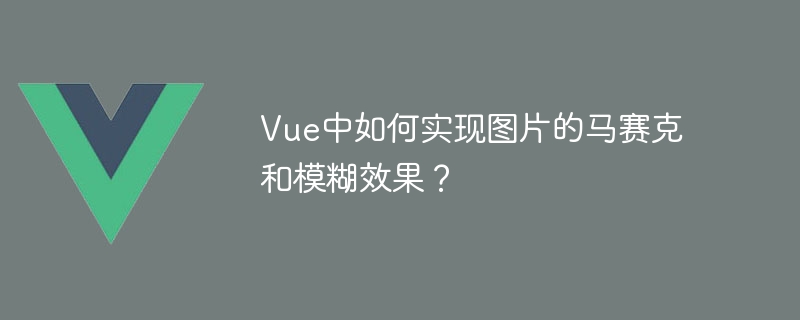

How to achieve mosaic and blur effects of images in Vue?
Mosaic and blur effects are common image processing methods. They can make images more artistic and have special effects. It is relatively simple to implement these effects in Vue. We can use the HTML5 canvas element and some third-party libraries to achieve it. This article will introduce the implementation method from two aspects: mosaic and blur, and attach corresponding code examples.
1. To achieve the mosaic effect of images
npm install pixi.js --save
import * as PIXI from 'pixi.js'
<template>
<div>
<canvas ref="canvas"></canvas>
</div>
</template>mounted hook function of the Vue component, use pixi.js to create a canvas object, And load the image: mounted() {
const canvas = this.$refs.canvas;
const app = new PIXI.Application({
view: canvas,
width: 500,
height: 500,
transparent: true,
});
PIXI.Loader.shared.add('image', 'path/to/your/image.jpg').load((loader, resources) => {
const sprite = new PIXI.Sprite(resources.image.texture);
sprite.width = app.view.width;
sprite.height = app.view.height;
const filter = new PIXI.filters.PixelateFilter();
sprite.filters = [filter];
app.stage.addChild(sprite);
app.ticker.add(() => app.render());
});
}In the above code, a PIXI.Application object is first created and the canvas element is passed in. Then, use PIXI.Loader to load image resources, and use PIXI.Sprite to create a sprite object and set it to full screen display. Next, a PIXI.filters.PixelateFilter object is created and applied to the sprite object to achieve a mosaic effect. Finally, add the sprite object to the stage and listen to the rendering event through the app.ticker.add method so that the canvas can be dynamically updated.
2. To achieve the blur effect of images
npm install blur.js --save
import Blur from 'blur.js'
<template>
<div>
<img ref="image" src="path/to/your/image.jpg" alt="image">
</div>
</template>mounted hook function of the Vue component, use blur.js to add blur to the picture element Effect: mounted() {
const image = this.$refs.image;
const blur = new Blur({
image,
radius: 10,
});
blur.init();
}In the above code, the reference to the image element is first obtained. Then, a Blur object is created and the image element and blur radius are passed in. By calling the blur.init method, you can add a blur effect to the image element.
Summary:
This article introduces the methods of achieving image mosaic and blur effects in Vue, and gives corresponding code examples. By using the third-party libraries pixi.js and blur.js, we can easily achieve these effects. Hope this article is helpful to you!
The above is the detailed content of How to achieve mosaic and blur effects of images in Vue?. For more information, please follow other related articles on the PHP Chinese website!
 Computer 404 error page
Computer 404 error page
 Solution to the Invalid Partition Table prompt when Windows 10 starts up
Solution to the Invalid Partition Table prompt when Windows 10 starts up
 How to solve the problem of missing ssleay32.dll
How to solve the problem of missing ssleay32.dll
 How to set IP
How to set IP
 How to open state file
How to open state file
 Why is the mobile hard drive so slow to open?
Why is the mobile hard drive so slow to open?
 What are the basic units of C language?
What are the basic units of C language?
 What platform is Kuai Tuan Tuan?
What platform is Kuai Tuan Tuan?




